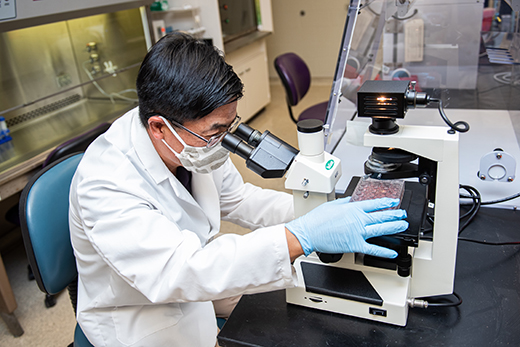New $3.7 million NIH grant supports collaborative research into COVID-19 treatment
Friday, Aug. 20, 2021

Kyeong-OK "KC" Chang, virologist with Kansas State University's College of Veterinary Medicine, recently received a $3.7 million grant to further development of COVID-19 therapeutic treatment. | Download this photo.
MANHATTAN — As the fight against COVID-19 continues, Kansas State University has received a five-year, $3.7 million grant from the National Institutes of Health's National Institute of Allergy and Infectious Diseases to research a new treatment method for the virus.
Kyeong-Ok "KC" Chang, a virologist at the Kansas State University College of Veterinary Medicine, is the principal investigator for the project, "Small Molecule Inhibitors Against 3C-Like Protease of SARS-CoV-2." The project's goal is to complete development of a drug for preclinical studies, ultimately leading to a COVID-19-specific antiviral therapeutic treatment.
"There is currently an urgent and unmet need for the discovery and development of antiviral therapeutics for the treatment of SARS-CoV-2, the causative agent of COVID-19," Chang said.
Yunjeong Kim, a virologist from Kansas State University, serves as co-principal investigator along with William C. Groutas, a medicinal chemist at Wichita State University; Stanley Perlman, a professor of microbiology and immunology from the University of Iowa; and Scott Lovell, a structural biologist at the University of Kansas.
Chang's group has been working on antiviral drug development against both human and animal coronaviruses for over a decade, with a focus on protease inhibitors.
"Recent advances of our efforts on the drug development include identification of potent compounds effective against SARS-CoV-2 confirmed by cell culture testing, X-ray co-crystallography and an animal model," Chang said.
Chang and Kim, along with Groutas and Perlman recently published new findings on SARS-CoV-2 treatment options.
"Drs. Chang and Kim have over 30 years of collective experience investigating coronaviruses and other similar viruses," said Derek Mosier, department head of diagnostic medicine and pathobiology in the College of Veterinary Medicine. "They have established a well-deserved international reputation for research excellence and discovery, so their recent success comes as no surprise. Their contributions to the research efforts of the College of Veterinary Medicine and Kansas State University are invaluable."
